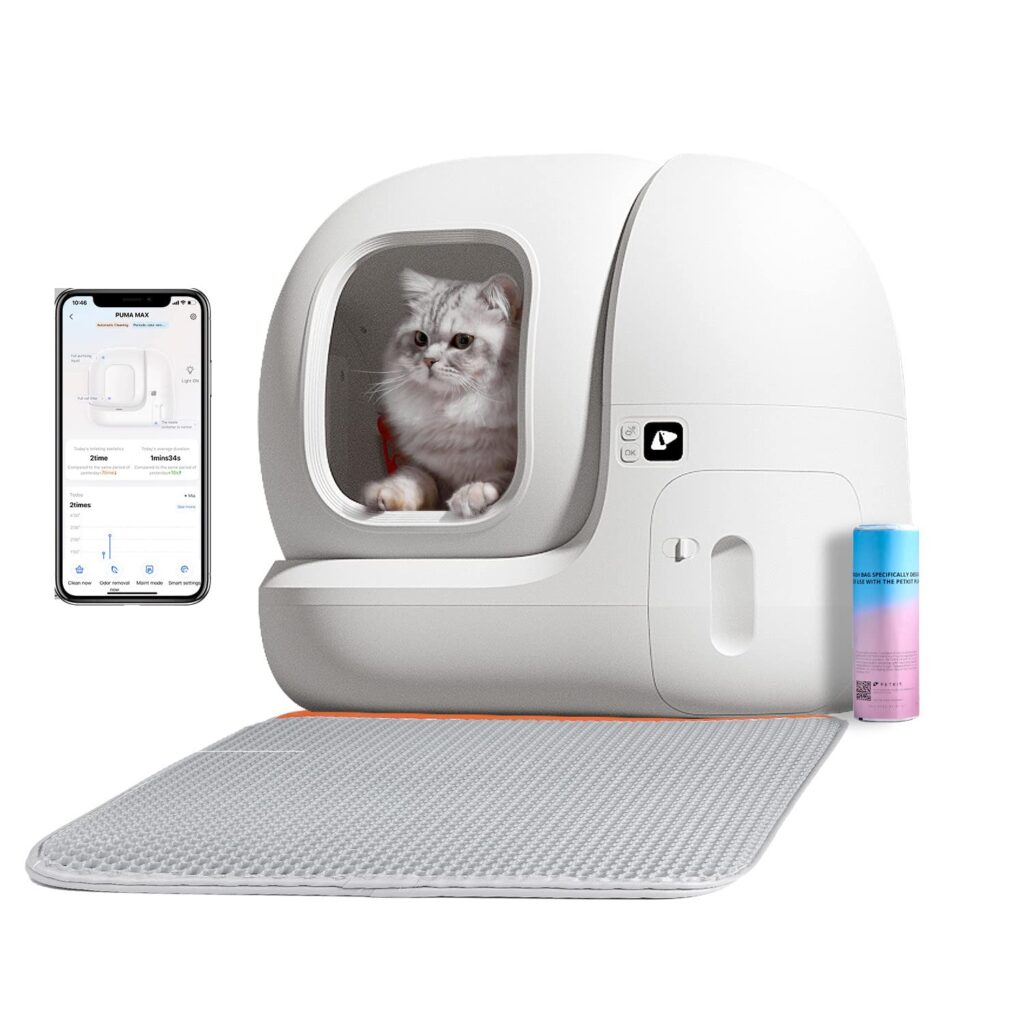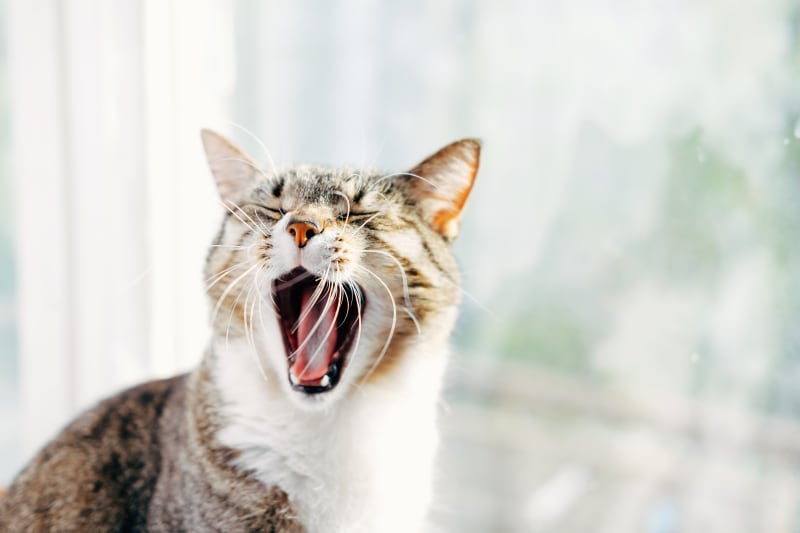If your cat is sneezing but seems fine, it could be due to allergies or a minor respiratory infection. Sneezing in cats can be caused by irritants such as dust, pollen, or certain fumes.
It can also be a symptom of a viral or bacterial infection, although in these cases, the cat might show other signs like nasal discharge or lethargy. It’s important to monitor your cat’s condition and consult with a veterinarian if the sneezing persists or if other symptoms develop.
A professional can provide an accurate diagnosis and recommend appropriate treatment to help your cat feel better.
Contents
- 1 Common Causes Of Cat Sneezing
- 2 When To Worry About Excessive Sneezing
- 3 The Normal Frequency Of Sneezing In Cats
- 4 Evaluating Your Cat’s Overall Health
- 5 Feline Upper Respiratory Infection (uri)
- 6 Feline Herpesvirus (fhv-1)
- 7 Feline Calicivirus (fcv)
- 8 Common Allergens For Cats
- 9 Allergic Rhinitis In Cats
- 10 Household Cleaners And Chemicals
- 11 Secondhand Smoke Exposure
- 12 Natural Methods To Soothe Cat Sneezing
- 13 When To Consult A Veterinarian
- 14 Frequently Asked Questions On Cat Keeps Sneezing But Seems Fine: What’s Happening?
- 15 Conclusion
Common Causes Of Cat Sneezing
Viral Infections: Viral infections are one of the common causes of cat sneezing. Cats can be affected by viruses such as feline herpesvirus and calicivirus, which can lead to respiratory symptoms including excessive sneezing. These viruses are highly contagious and can spread easily among cats.
Allergies: Cats can also experience sneezing due to allergies. Just like humans, cats can be allergic to different substances such as pollen, dust mites, or certain foods. Allergic reactions can cause sneezing, itchiness, and watery eyes in cats.
Environmental Irritants: Environmental irritants such as smoke, strong perfumes, or cleaning products can trigger sneezing in cats. Cats have sensitive respiratory systems, and exposure to these irritants can result in sneezing fits.
If your cat keeps sneezing but seems otherwise healthy and shows no other concerning symptoms, it is usually nothing to worry about. However, if the sneezing persists or is accompanied by other signs such as nasal discharge, coughing, or difficulty breathing, it is best to consult a veterinarian for a proper diagnosis and treatment.

Credit: brightcarevet.com
When To Worry About Excessive Sneezing
Cat keeps sneezing but seems fine? It is natural to be concerned when your feline friend is constantly sneezing. While occasional sneezing is normal, persistent sneezing could be a cause for concern. If your cat is repeatedly sneezing throughout the day or for an extended period, it may indicate an underlying issue.
Aside from sneezing, pay attention to any additional symptoms your cat may exhibit. These could include watery eyes, nasal discharge, coughing, or changes in appetite or behavior.
Another factor to consider is the duration of the sneezing. If your cat has been sneezing excessively for more than a few days, or if the sneezing worsens over time, it is recommended to consult a veterinarian.
The Normal Frequency Of Sneezing In Cats
The normal frequency of sneezing in cats can vary depending on various factors. Occasional sneezing is quite common and is usually nothing to worry about. Cats may sneeze occasionally to clear their nasal passages or due to minor irritations, such as dust or allergies. However, excessive sneezing could be a cause for concern and may indicate an underlying health issue.
There are several contextual factors to consider when evaluating a cat’s sneezing. If the sneezing is accompanied by other symptoms such as nasal discharge, coughing, or difficulty breathing, it may be a sign of an upper respiratory infection or allergies. Additionally, if your cat has been exposed to any new environmental factors such as cleaning products, smoke, or plants, it could be triggering the sneezing.
When assessing your cat’s overall health, it’s important to observe their behavior, appetite, and energy levels. If your cat seems otherwise fine and is not showing any other signs of illness, occasional sneezing is likely normal. However, if the sneezing persists or worsens, it is recommended to consult a veterinarian for a thorough examination and proper diagnosis. Remember to always prioritize your cat’s well-being and seek professional advice when needed.
Evaluating Your Cat’s Overall Health
If your cat is sneezing but appears otherwise healthy and normal, you may want to monitor their behavior and appetite for any changes or abnormalities. Cats are usually creatures of habit, so any deviation from their usual routine could be a sign of an underlying issue. Check if your cat is eating and drinking normally, as a loss of appetite could indicate a more serious problem. Additionally, observe their behavior for any signs of lethargy, irritability, or unusual aggression. Cats are masters at masking their pain, so be attentive to any subtle changes.
Another indicator of a potential problem is the presence of nasal discharge or bleeding. If you notice any fluid coming from your cat’s nostrils, it could be a sign of an upper respiratory infection or an allergy. However, if the discharge is accompanied by blood, it might warrant a visit to the vet. Nasal bleeding could suggest a more serious issue, such as an injury or a nasal tumor. Keep an eye on the frequency and intensity of sneezing, as it can provide valuable information to the vet if you do decide to seek professional advice.
Remember, every cat is unique, and what may seem minor to one could be a cause for concern in another. Trust your instincts and consult with a veterinarian if you have any doubts about your cat’s health.
Feline Upper Respiratory Infection (uri)
Feline Upper Respiratory Infection (URI) is a common ailment among cats that can cause sneezing and other symptoms. This infection is usually caused by a combination of viruses and bacteria. The most common viruses involved are feline herpesvirus and feline calicivirus. These viruses can spread easily through direct contact between cats, especially in crowded environments like shelters or multi-cat households.
Causes And Transmission Of Uri
The main cause of feline URI is the transmission of viruses and bacteria through the air or direct contact with infected cats. Sneezing, coughing, and close proximity to infected cats can lead to the transmission of the infection. Cats who share litter boxes, food bowls, or bedding are more likely to contract the illness.
The viruses and bacteria responsible for URI can survive on surfaces and in the environment for a short period of time, making it easy for the infection to spread. Additionally, stress and weakened immune systems can increase a cat’s vulnerability to URI.
Common Symptoms Of Uri In Cats
URI can manifest in various ways, and the symptoms can vary from mild to severe. Some common signs of URI include:
- Sneezing
- Nasal congestion
- Runny nose
- Watery or discharge-filled eyes
- Coughing
- Loss of appetite
- Lethargy
- Fever
If your cat is exhibiting these symptoms, it’s important to consult a veterinarian for an accurate diagnosis and appropriate treatment. URI can be managed with supportive care, such as antibiotics to treat secondary bacterial infections and antiviral medications to alleviate symptoms. Ensuring proper hygiene and minimizing stress can also help prevent the spread of URI.
Feline Herpesvirus (fhv-1)
Cat Keeps Sneezing But Seems Fine: What’s Happening?
If your cat keeps sneezing but appears to be otherwise healthy, the culprit may be Feline Herpesvirus (FHV-1). This common respiratory infection affects cats of all ages and breeds, with symptoms including sneezing, nasal discharge, and conjunctivitis. FHV-1 is highly contagious and spreads through direct contact with infected cats or contaminated objects. Stress, overcrowding, and poor hygiene can trigger recurrent flare-ups.
How FHV-1 Affects Cats:
FHV-1 primarily affects the upper respiratory tract of cats, causing inflammation and irritation. Sneezing is a common symptom as the virus irritates the nasal passages. Cats may also experience watery eyes, nasal discharge, and occasionally develop mouth sores. While most cats recover within 2-3 weeks, the virus remains dormant and can reactivate during periods of stress.
Treatment and Prevention of FHV-1:
There is no cure for FHV-1, but supportive care can help alleviate symptoms. This includes keeping your cat’s environment clean, providing a warm and quiet space, and ensuring a well-balanced diet. If your cat’s symptoms worsen or persist, consult a veterinarian for further evaluation and potential antiviral medication. To prevent FHV-1, practice good hygiene, isolate infected cats, and vaccinate your pets as recommended.
Feline Calicivirus (fcv)
Feline Calicivirus (FCV) is a common viral infection among cats that can cause a range of symptoms, including sneezing. This virus is highly contagious and can spread easily among cats, especially in shelters or multi-cat households. FCV affects the upper respiratory tract and can lead to symptoms such as sneezing, nasal discharge, and conjunctivitis. In some cases, it can also cause ulcers in the mouth and tongue.
The impact of FCV on cats can vary depending on their overall health and immune system. While some cats may only experience mild symptoms, others may develop more severe complications. It is important to seek veterinary care if your cat keeps sneezing, as it could be a sign of an underlying infection.
Managing and preventing FCV infections involves a combination of vaccination, good hygiene practices, and regular veterinary check-ups. Vaccination can help protect cats against FCV and reduce the severity of symptoms if they do become infected. Keeping your cat’s environment clean and practicing good hygiene, such as regular handwashing and disinfecting surfaces, can also help prevent the spread of the virus. Regular veterinary check-ups can ensure early detection and prompt treatment of any infections.
| Managing and Preventing FCV Infections | ||
|---|---|---|
| Vaccination | Regular veterinary check-ups | Good hygiene practices |
Common Allergens For Cats
Cats can be prone to allergies, and several common allergens can trigger sneezing episodes in otherwise healthy cats. Pollen is a common allergen that cats may react to, especially during the spring and fall seasons. The fine particles can easily be carried indoors, affecting indoor cats as well.
Dust mites are microscopic creatures that live in house dust and can cause allergies in cats. They thrive in warm and humid environments, making them a year-round concern for cat owners.
Mold spores are another common allergen that can lead to sneezing in cats. Mold can grow in various places like damp areas in your home, such as the bathroom or basement.
If your cat is repeatedly sneezing but otherwise appears healthy, it is worth considering these common allergens. Identifying and minimizing exposure to these allergens can help alleviate your cat’s sneezing and ensure their overall well-being.
Allergic Rhinitis In Cats
Allergic rhinitis, commonly known as hay fever, can also affect cats. This condition occurs when a cat’s immune system overreacts to certain allergens, such as pollen, dust mites, or mold spores. The most common symptom of allergic rhinitis in cats is sneezing. Cats with this condition may have repetitive sneezing episodes but appear otherwise healthy.
Other symptoms of allergic rhinitis in cats include runny nose, watery eyes, and itchy skin. You may notice your cat rubbing their face or shaking their head to alleviate the discomfort. Sometimes, cats with allergic rhinitis may also develop respiratory congestion and coughing.
Treatment for allergic rhinitis in cats involves identifying and avoiding the specific allergens triggering the symptoms. Your veterinarian may recommend antihistamines or corticosteroids to alleviate the signs of inflammation. Additionally, improving indoor air quality and implementing regular cleaning can help reduce exposure to allergens.
In conclusion, if your cat keeps sneezing but seems otherwise fine, they may be experiencing allergic rhinitis. Recognizing the symptoms and seeking veterinary care can improve your furry friend’s comfort and quality of life.
Household Cleaners And Chemicals
Cats are highly sensitive creatures, and certain household cleaners and chemicals can have harmful effects on their health. Many cleaning products contain toxic ingredients such as ammonia, bleach, and phenols, which, when inhaled or ingested, can cause respiratory problems, skin irritations, and even organ damage.
It is crucial to be cautious when using these products, especially in areas where your cat spends a lot of time.Keep your cat away from recently cleaned surfaces until they are completely dry and avoid using products directly on surfaces that your cat frequently comes into contact with.
| Product | Safer Alternative |
|---|---|
| All-purpose cleaner | Mixing white vinegar and water in a 1:1 ratio |
| Window cleaner | Using a solution of lemon juice and water |
| Carpet cleaner | Using baking soda to absorb odors, then vacuuming |
By opting for natural and pet-friendly alternatives to chemical cleaners, you can ensure your cat’s well-being without compromising cleanliness in your home. Always read product labels carefully and store cleaners safely out of your cat’s reach. If your cat continues to show symptoms like sneezing or coughing, it is recommended to seek veterinary advice to rule out any underlying health issues.
Secondhand Smoke Exposure
Secondhand Smoke Exposure
Exposing your cat to secondhand smoke can pose serious health risks. Cats are especially susceptible to the negative effects of smoke inhalation due to their small size and delicate respiratory systems. Signs that your cat may have inhaled smoke include excessive sneezing, coughing, wheezing, and difficulty breathing. It is important to note that even if your cat seems fine otherwise, continuous exposure to secondhand smoke can lead to long-term health issues such as respiratory infections, asthma, bronchitis, and even cancer. To ensure the well-being of your feline friend, it is crucial to create a smoke-free environment. This involves smoking outside or in a well-ventilated area away from your cat, washing your hands thoroughly after smoking, regularly cleaning your home to reduce smoke residue, and using air purifiers to improve air quality. By taking these precautionary measures, you can help protect your cat from the harmful effects of secondhand smoke.
Natural Methods To Soothe Cat Sneezing
In order to naturally soothe cat sneezing, there are several methods that can be implemented. One such method is steam inhalation. This involves creating a steamy environment for your cat to breathe in, which can help to relieve congestion. Another option is to use a saline nasal rinse, which can help to flush out any irritants or allergens that may be causing the sneezing. It is also important to ensure that your cat is properly hydrated and receiving a well-balanced diet. This can help to boost their immune system and reduce any inflammation that may be contributing to the sneezing. Additionally, providing a clean and dust-free environment for your cat can help to minimize any potential allergens that may be triggering the sneezing. By implementing these natural methods, you can help to alleviate your cat’s sneezing symptoms and promote their overall well-being.
When To Consult A Veterinarian
When your cat keeps sneezing but seems fine, it is important to know when to consult a veterinarian. One consideration is if your cat has persistent or severe symptoms. If your cat’s sneezing is accompanied by other signs such as coughing, nasal discharge, or difficulty breathing, it may indicate an underlying medical condition that requires attention.
There are several underlying medical conditions that could be causing your cat’s sneezing. These include allergies, upper respiratory infections, dental issues, foreign objects lodged in the nasal cavity, or tumors. It is important to have a veterinarian evaluate your cat’s symptoms to determine the cause and appropriate treatment.
To diagnose the underlying cause of your cat’s sneezing, your veterinarian may recommend diagnostic tests. These could include blood work, nasal swabs, X-rays, or a nasal endoscopy. These tests help to identify the specific condition affecting your cat and guide the treatment plan.
Frequently Asked Questions On Cat Keeps Sneezing But Seems Fine: What’s Happening?
Why Is My Cat Sneezing But Acting Normal?
Cats may sneeze due to irritants, allergies, or an upper respiratory infection. If your cat is sneezing but acting normal otherwise, it is likely just a mild irritation or temporary reaction to something in the environment. However, if the sneezing persists or is accompanied by other symptoms, it is best to consult a veterinarian for further evaluation.
Why Is My Cat Sneezing But No Other Symptoms?
Cats can sneeze without other symptoms due to common irritants like dust, pollen, or mild allergies.
When Should I Worry About My Cat Sneezing?
If your cat is sneezing occasionally, it’s usually nothing to worry about. However, if sneezing is frequent, accompanied by other symptoms like nasal discharge or difficulty breathing, it’s best to consult a veterinarian for proper evaluation and treatment.
What To Do When Your Cat Keeps Sneezing But Seems Fine?
If your cat keeps sneezing but appears healthy, it’s likely due to environmental irritants. Clean your cat’s living area and keep it well-ventilated. Avoid scented products. If symptoms worsen or additional signs arise, consult a veterinarian.
Conclusion
To sum up, if your cat keeps sneezing but otherwise appears to be fine, it could be a result of harmless irritants or allergies. However, persistent or severe sneezing could indicate an underlying health issue, so it’s important to monitor your cat’s symptoms closely.
If you have any concerns, it’s best to consult your veterinarian for a proper diagnosis and treatment. Ensuring a healthy and safe environment for your feline companion is key to their overall well-being.

Katie Lindsey is a passionate cat lover and founder of Cats Solution, a comprehensive resource for all things feline. With a lifelong love for cats and extensive knowledge in their care and behavior, she provides expert advice and solutions to cat owners. Through her website, Katie fosters a supportive community where cat enthusiasts can find guidance and heartwarming stories. A dedicated advocate for animal welfare, Katie also promotes responsible pet ownership and adoption. Join her on this purr-fect journey celebrating the joy of feline companionship.



